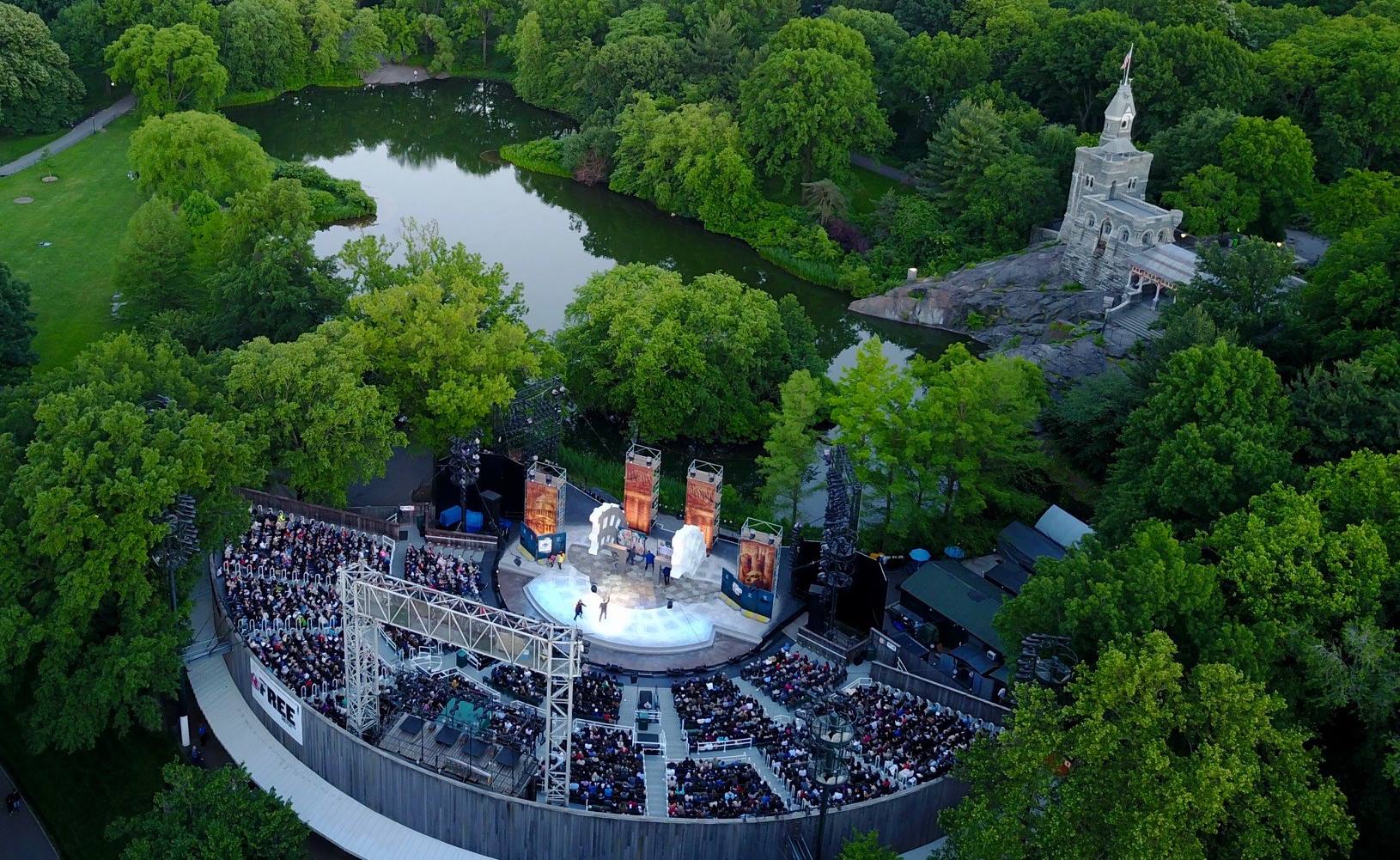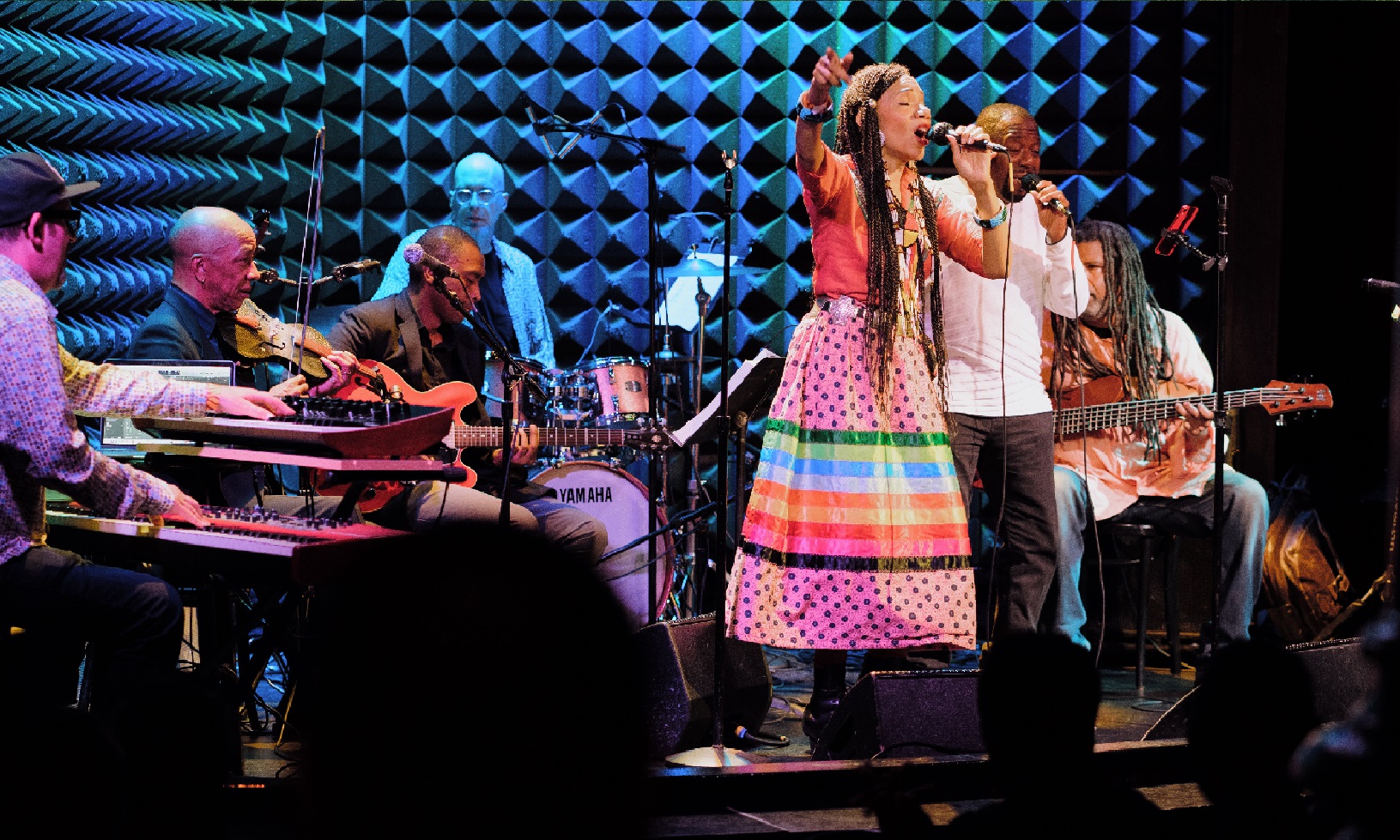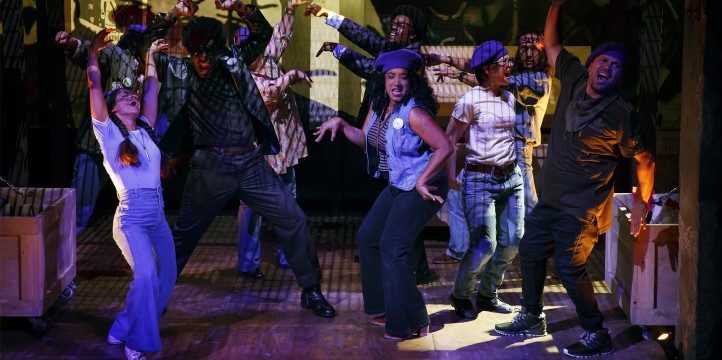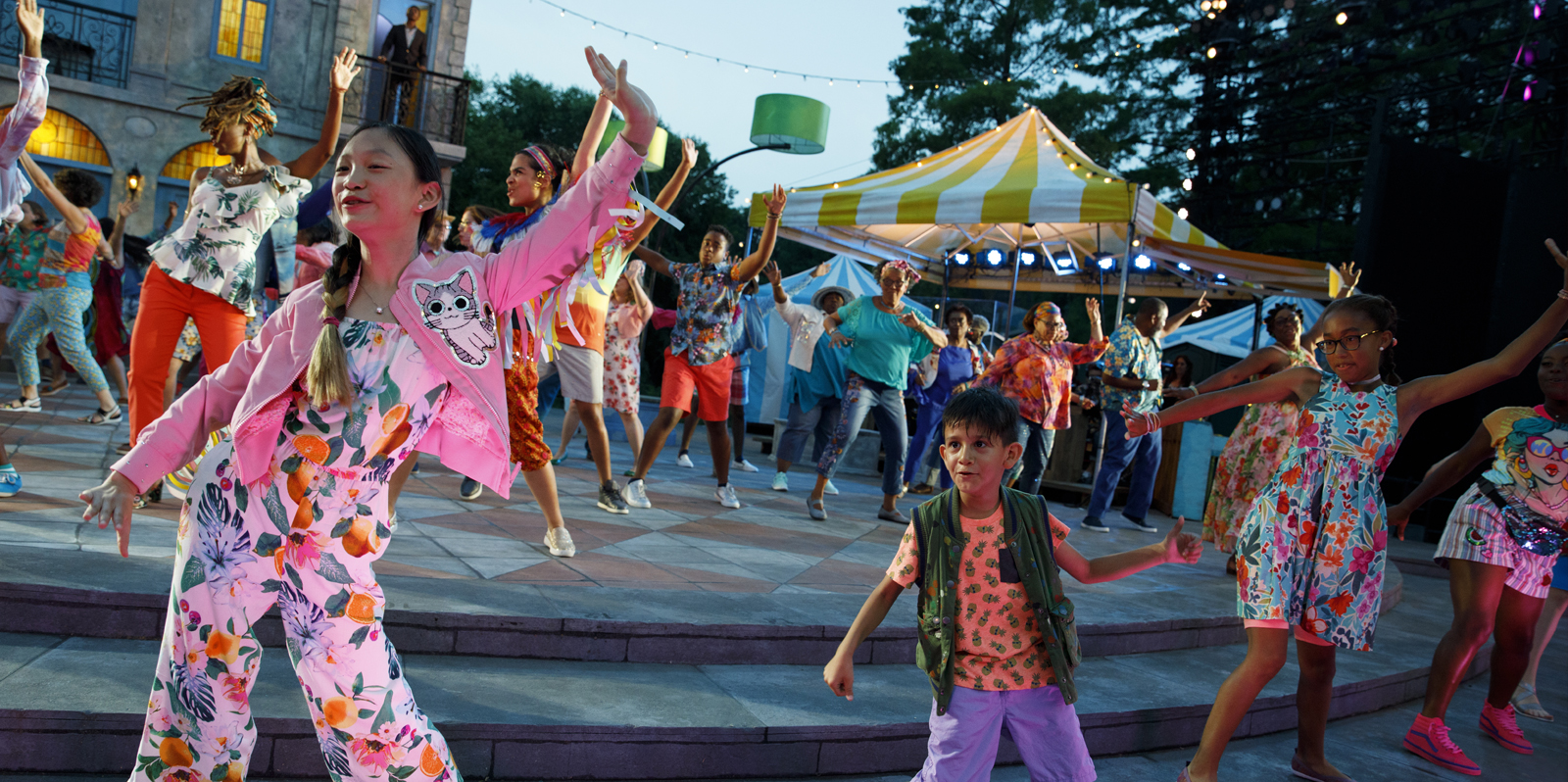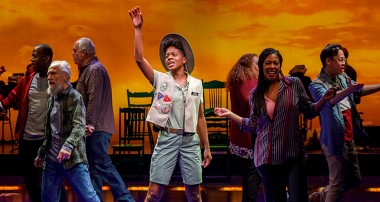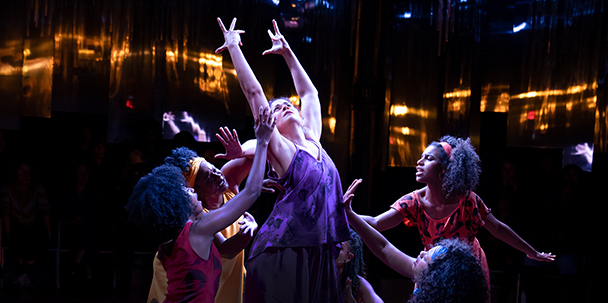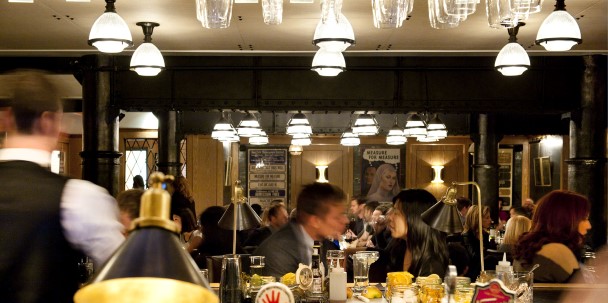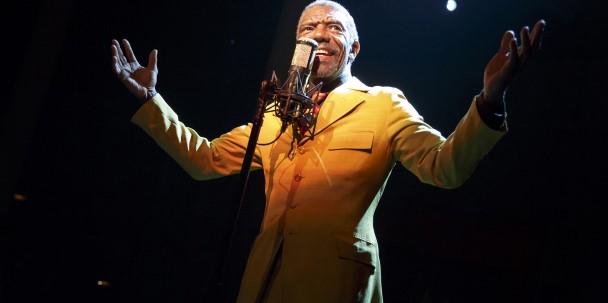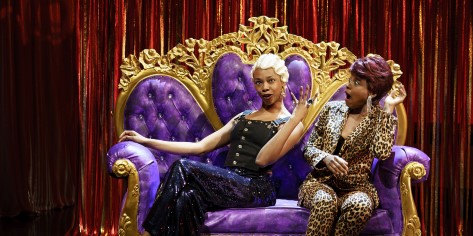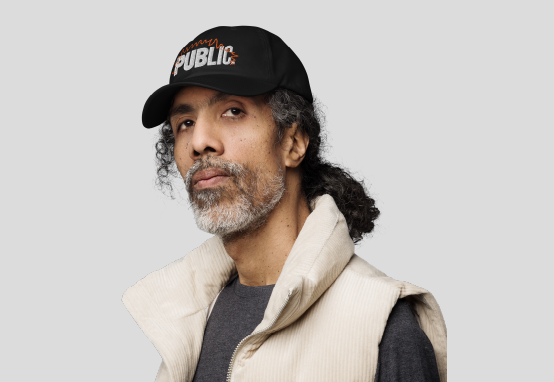Jaclyn Backhaus (JB): Aya, it’s so nice to speak with you, see your face, and learn that we’re neighbors!
Aya Aziz (AA): Literally right around the corner, it’s amazing!
JB: We have to turn this into a coffee at some point.
AA: We do, and we will.
- I'm excited to hear how you got into theatrical writing, songwriting. You wear many hats! How did you find your way into your artistry?
- I was an only child, and my father was always traveling. He worked with the UN and traveled around the world. And he would come back with stories that would inspire my own storytelling. So storytelling was always something sacred to me. And then I went to college and didn't do any of that! Ultimately I ended up in Lebanon with my father, where I was pursuing human rights work, and I got to meet all of these artists from Syria and Lebanon, extraordinary filmmakers, writers, dancers, creators. I had been songwriting to kind of hold the weight of everything that I was witnessing and hearing. And one dear person, my friend Jessica Khazrik, a wonderful artist in her own right, said, “I love your music. I know the folks at the Metro Al-Madina Theater in Beirut and I want to pitch your show.” And they gave me a two-hour show on a Wednesday night.
I was somewhat of an oddity. I mean, I was of two places. I grew up in New York, and was making art and musical theater, and I had a shaved head, and I talked about sexuality and identity and belonging, and folks thought, well that's going to draw some kind of crowd! And they paired me with this phenomenal jazz musician, Marc Ernest, and we made a one-woman show, Sitting Regal By the Window. And people loved it, so when I came back to New York I pitched it to Fringe and to Planet Connections Theatre Festivity, both of which are no longer in operation, and my friend Iffy Roma produced it. Arpita Mukherjee, the Artistic Director of Hypokrit Theatre Company, happened to see it in the basement of the Paradise Theater Factory, and we went on to develop a musical together. So I started as a solo performer, and, in collaboration, began weaving the stories I wanted to tell into a larger ensemble piece, and a tapestry of narratives.
JB: I had the immense privilege of seeing a workshop production back in 2019. I was so struck by the various forms you were using, the various facets of the collaborative process that you seemed to be embodying. I was really thrilled by it. What has been your favorite component of the piece's evolution from those early solo days to how it is formed now?
AA: I mean, that show that you saw in 2019 held so much of the solo-show version. I was telling stories, some fictional, some inspired by life, by family and personal experience. In this version, I've been able to fictionalize and live in the freedom of fiction in ways that are exciting to me. I went back and forth over, you know, the power of having a narrator. In this version, I'm experimenting with the removal of a primary character or storyteller, and allowing space for other characters to narrate their sense of memory and story to each other. The way it's told feels more democratic. I think I always wanted it to be that, but I've really struggled with how to allow myself, in fiction, to hold what is authentic in our Egyptian diaspora and experiences. I was so concerned with authenticity, but what is authenticity? Instead of worrying about that, I want to give my characters the time and space to tell me who they are.
JB: I was so struck by the really sharp, keen specificity of the characters. And we get such sharp insight into the larger themes that you're speaking to: patterns of movement, patterns of landing, of belonging, or yearning to move again. There’s so much contained in that idea, what it means to be contending with generational diasporic movements. Your play is filled with as many specific points of view, as many relationships to that particular experience, as there are characters in it. When we're telling these stories, that specificity is so key, so exciting to see, and so moving. I totally resonate with you in that question of authenticity, and it always comes down to, how are these characters being embodied? We’re never gonna get authenticity within a homogeneity, you know.
AA: I think what I've been holding on to is the search for dignity. Like, where do we find that? How do we self-actualize? And time — the present moment shapes our sense of self, shapes our aspirations and the ways we make meaning. There is this generational shift, and what that means between the younger and older generations in the play; the ways identity, personal experience, pain, trauma, and points of humiliation shape what each character holds as their power, and their center.
My father is such a dramaturg of this play. You know, I’ll send excerpts to him, and he’s like, no one would say that! [Laughter.] They should say this!
JB: Prescriptive dramaturgy! No, I do the same thing. Especially when we're dealing with generational inquiry. Something that I also really appreciate about this piece is that we also get to see the parents when they're young. Like, we get to see them when they were the youth generation, having their big dreams, their big, contradictory, rebellious feelings, or harmonious feelings, you know, aligned with the generation before them. There's so much idiosyncrasy there about what those views are, what they were, how they may have evolved and changed as people have grown. So I think it's honestly a very useful dramaturgical practice to be like, how is this aligning with you? Where does this resonate? Because you know, sometimes dads know.
AA: There's this line in the play, “I'm a recovering Egyptian.” It’s an interpretation of something my father said: “Sometimes I feel like I'm recovering from Egypt.” I loved that. Recovering from, I think he meant, the ways that that society kind of oppresses, or oppressed him personally, and left him laden with a certain shame, and ways of thinking that he has defined himself against now, over the years of his absence. My dad is not a character in this play, but there are parts of him in the play. And I took that and shared that line with him, and he said, “That's not how I feel at all!” [Laughter.]
I think he's the reason I'm a writer. So I've definitely created this piece in conversation with him.
JB: That's beautiful.
As a writer, solitude has become such a part of my practice. I am always so keen to hear from other writers a bit about their processes, because it feels so inspiring and so delicious to be like, “Oh, you do this!” So I have a couple of writer-process questions if that's cool.
Do you have a favorite space or place to write?
AA: To silence the perfectionist part of myself, I have, especially in this process — which has held so many experiences now over so many years that I feel like it's laden with a lot of feeling, impostor syndrome included — I've been going to public space. Like, filling myself with self with conversations. I've been going to this cafe, Cute Cat Cafe.
JB: I was just there! Love that place. I had a sandwich.
AA: Yes! So I sit at Cute Cat. And now I know everyone there, and all the cats. And the folks there are so kind, because I see them every other day. And I realized this is like a huge hangout for the Egyptian community in Ridgewood. There is a huge Egyptian Coptic community in Ridgewood. And I was writing a scene like two or three months ago. I know you write in solitude, but you know sometimes when your brain listens to something that you're not fully conscious you're listening to? I realized I was listening to a conversation in Arabic behind me, among young people, younger than me. I went back the next day, and the same thing happened. I was just surrounded by Egyptian Arabic, and stories, and young folks who were like, not speaking English to each other! I have a date to meet up with some of these wonderful people who invited me to join the youth group at their church, which I’m so looking forward to. But I just realized that the universe brought me to Ridgewood by happenstance, and I've been seeing the younger generation of Egyptians in diaspora speaking fluent Arabic here. And you know, with their noses and septums pierced, and bright blue hair, and you know, just living their best lives with their parents. It’s fascinating and wonderful to watch how we evolve and still hold our identities alongside all of our evolutions over time. So I've been going to Cute Cat.
JB: Having meet-cutes at Cute Cat!
AA: I'm just so blessed. Who knew? I had no idea there was such an enclave here.
JB: You continue to write music. And I'm curious to know, in the context of your larger body of work, how do you navigate the shifts between the modes in which you're working?
AA: When I'm in a healthy creation space, I'm doing both simultaneously. They feed each other, and Finding Paradise — even though it's moved a little more toward a traditional book musical — in that the songs carry the action forward in addition to just the feeling of the characters — it really is a songwriter's musical. There are a few songs that follow a traditional musical theater structure, but the rest are like pop songs that have come out of my own genre of writing, that is just natural to me. So I'm still doing that. And I have an album coming out imminently, as soon as I can continue working on it. I'm excited to learn how to balance both, because they feed each other. Dance feeds my work too. I need to take dance breaks, or sometimes when I'm stuck in a scene I have to move through the feeling of where I'm at in order to process it and move forward.
I also want to speak to your question about process and solitude. I have found that I am an intensely collaborative writer. In all of my writing processes, I have had to be in conversation with people. I think as we grow as writers, we find new ways of holding to our own sensibility. But even in holding to my own sensibility, that sensibility is always in conversation. Even when I make the choices, I want those choices to be an offering to other people's sense of truth. Because in the end I hope that this art is not for me, as much as it is for all the other people in my life who brought these experiences and feelings to the forefront of my mind.
JB: That’s lovely. The idea of collectively activated prompts. That this work is not the thesis; it is, itself, a prompt toward the next conversation.
And the songs are fire. I mean, one of the songs, specifically, for the last four years I will get stuck in my head maybe once every two months. I'll be like, “Oh, yeah, there it is. That banger!”


